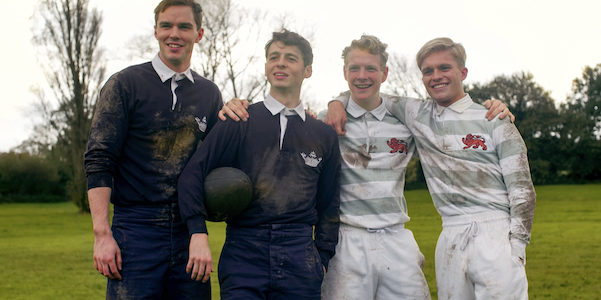
ReelBob: ‘Tolkien’ ★★
By Bob Bloom
It’s unfortunate that a movie about J.R.R. Tolkien, one of the most imaginative writers of fantasy novels, should turn out to be so dull — and unimaginative.
“Tolkien” is more of a sketch of the future author’s early experiences and influences, rather than a fully realized canvas.
It shows glimpses of his proficiency with languages, as well as his inspirations and creativity, but it feels incomplete and insufficient.
The movie’s emphasis is placed on Tolkien’s formative years in which he and his younger brother were orphaned after the death of their mother. Tolkien eventually finds himself attending King Edward’s School in Birmingham, where he makes friends with three other boys.
That fellowship becomes one of the major influences of Tolkien’s life.
Tolkien had a mind that soared; one that created entire new worlds complete with languages, histories and legends. Yet “Tolkien” is pedestrian; grounded in formulaic biopic tropes.
It does not help that Nicholas Hoult, who plays the adult Tolkien, is uninteresting. Many scenes depict him jotting down ideas or sketching characters in various notebooks. Others have him scrutinizing trees — as if trying to connect with them — and continually seeking ideas to help formulate the visions he conjures in his head.
Director Dome Karuloski and writers David Gleeson and Stephen Beresford are unable to adequately convey Tolkien’s intellect in cinematic terms that translate for the audience.
The movie’s best sequences involve Tolkien’s time in the trenches during World War I, which, like many men of his generation, profoundly impacted his later life.
It is ironic that the war — in a sense — provided the catalyst for what Tolkien was to write.
“Tolkien” shares a bond with 2017’s “Goodbye Christopher Robin,” which showed the war’s effect on author A.A. Milne, creator of “Winnie the Pooh.” Like Tolkien, he, too, used writing as a catharsis for what he experienced.
Throughout the movie, Karuloski offers glimpses and reference points that guide us to events, situations and characters Tolkien later incorporated into his “Lord of the Rings” trilogy and other writings. Smartly, they are just enough to whet your appetite without being too obvious.
“Tolkien” relies on too many biopic clichés to advance the story — from the hardships of Tolkien’s youth to the conflicts with his soon-to-be comrades and the on-and-off relationship with his future wife, Edith, played in a fiery and resolute manner by Lily Collins.
One of the major flaws of “Tolkien” is that his friends — played by Patrick Gibson as Gilson, Anthony Boyle as Smith and Tom Glynn-Carney as Wiseman — display more personality than Hoult’s characterization. The root of that problem may be the script, Hoult’s performance or Tolkien’s introvert personality — or a combination of any of those,
A minor character who stands out is Tolkien’s aide-de-camp in the WWI trenches, played by Craig Roberts. He is devoted to his Lt. Tolkien and continually stays by his side as Tolkien searches the front for Smith. He refuses to leave when Tolkien so orders.
The name of Roberts’ character is Sam; whether true or a plot device, Tolkien readers will appreciate the gesture.
Creating stories about literary figures is a daunting task because their work basically is shaped in their minds. Effectively transposing that to a movie screen most often falls short — no matter how inventive the filmmaker.
That is “Tolkien’s” major flaw. His vision introduced us to wonderful and frightening worlds and people that even a cinematic wizard would have difficulties conjuring adequately.
I am a founding member of the Indiana Film Journalists Association. My reviews appear at ReelBob (reelbob.com) and Rottentomatoes (www.rottentomatoes.com). I also review Blu-rays and DVDs. I can be reached by email at bobbloomjc@gmail.com or on Twitter @ReelBobBloom. Links to my reviews can be found on Facebook, Twitter and LinkedIn.
TOLKIEN
2 stars out of 4
Not rated, sequences of war violence
